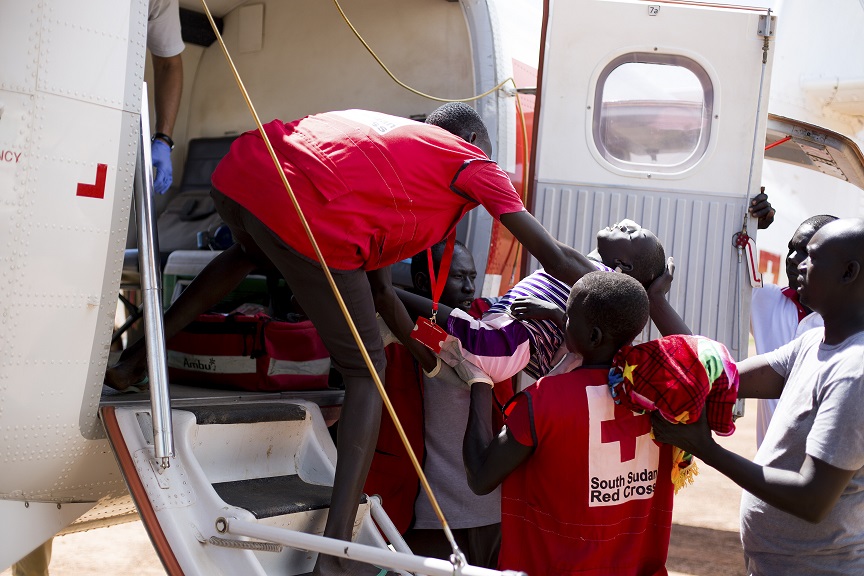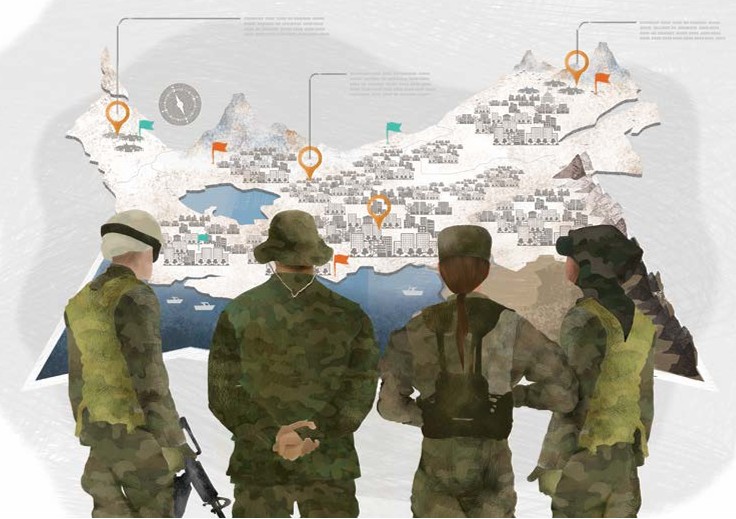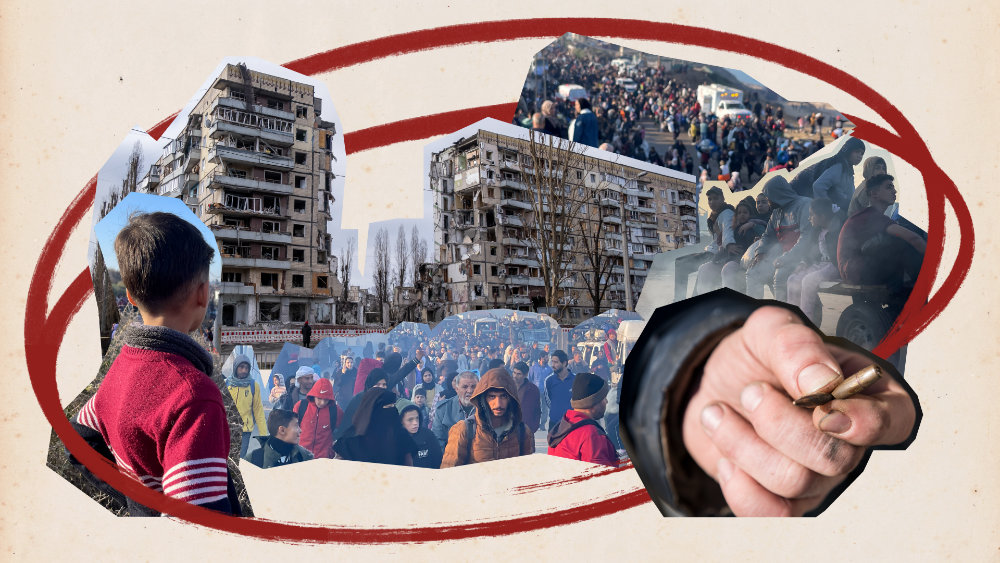On the eve of the declaration of independence by the Republic of South Sudan in 2011, the Red Cross and Red Crescent Movement welcomed the establishment of a new National Red Cross Society – the South Sudan Red Cross. One and a half years later, civil war broke out in the newly formed country.
For this post, as part of our series ‘Back to basics: humanitarian principles in contemporary armed conflict’, we sat down with John Lobor, the Secretary General of the South Sudan Red Cross Society, to discuss how the Fundamental Principles guided the South Sudan Red Cross in its initial setup and through the nascent country’s armed conflict.
Let’s start at the beginning. The South Sudan Red Cross is a relatively young National Society, created a little over ten years ago with the independence of South Sudan. What was the importance of the Fundamental Principles in the development of that National Society in terms of governance and institutional setup?
The South Sudan Red Cross was made up of staff and volunteers who had worked for the Sudanese Red Crescent Society, which continues to operate in Sudan. The secession of South Sudan from the north in January 2011 paved the way for our new National Society in the south.
To help ensure a smooth transition, we began working with the ICRC and the IFRC delegation in Sudan to lobby for a law that would recognize the South Sudan Red Cross and provide legitimacy as a national humanitarian organization in accordance with the Fundamental Principles of the Red Cross and Red Crescent Movement.
To manage the resources and operations and for recruitment to take place, we had to ensure that the governance of the National Society reflected the identity of the population of South Sudan and the principles of unity and voluntary service. That means we had to recruit members and volunteers from the different communities of South Sudan. We also had to keep in mind the principle of unity – there can only be one National Society, Red Cross or Red Crescent, within the Republic of South Sudan, and it must be open to all.
So those were two important principles that we had to refer to in terms of the recruitment. But there was another tricky issue, which was a question from the population: Why are you changing from the Red Crescent to Red Cross? We explained that we can only have one National Society, and that the army of South Sudan had already been using the Red Cross as an emblem of the medical corps of the military. This was also the aspiration of most people in South Sudan, to have a Red Cross instead of a Red Crescent emblem. We explained that the two emblems, the Red Cross and the Red Crescent Movement, have the same weight and the same meaning.
We also had to follow the principles of humanity and impartiality in terms of responding to the material needs of the population, a principle whereby assistance is provided based on need. And of course, as a country that was emerging from and about to enter a new armed conflict, the principle of neutrality was very important for us to press upon our volunteers to ensure that we are not perceived to take sides in the conflict or engage in political dialogue that might compromise the integrity and perception of the National Society. So the principles of humanity, of impartiality, of unity, of neutrality, and then independence – making our own decisions in terms of determining the priorities of populations – were all key in setting up the South Sudan Red Cross.
Shortly following the creation of the South Sudan Red Cross, the country was plunged into armed conflict. Could you tell us a bit how the humanitarian principles helped your operations in this volatile context and also how it ensured the security of your staff and volunteers during this time?
Of course, the most difficult and challenging time that we went through was during the outbreak of the conflict in early 2013. This was a very critical period for the South Sudan Red Cross; we were afraid that this would affect the unity of the National Society.
I can give you one clear example, from Juba, where when the conflict broke out, the UN set up protection of civilians (POC) sites where people who saw themselves at risk of persecution fled. We sent our volunteers to one of these POC sites to set up water facilities for the people living there.
When the volunteers arrived, they were unfortunately attacked by some of the internally displaced people (IDPs) there, and two of them were severely beaten. When we got the report the next day, I went together with a colleague from the ICRC. We went into the camp and met with the chiefs to try to understand why the IDPs attacked the volunteers.
They told us the reason for the attack was that the South Sudan Red Cross was created by a law signed by President Salva Kiir. They said ‘this is the same government that was attacking us. We cannot allow you to come and provide services to us’. We explained the law was passed by parliament; which represents the population of South Sudan. The Head of State just signed it because he happened to be the Head of State at that particular time. So the fact that Salva Kiir signed the law does not mean that organization belongs to him. We explained that the Red Cross was an impartial, independent institution in terms of the services that we deliver. After a long discussion, they came to understand, and apologized for what had happened.
Afterwards, with ICRC support, we went to disseminate information – particularly in areas under opposition control – that the Red Cross is not politically aligned with the government. The National Society was then able to operate on both sides of the conflict without any problem, and the staff were able to move around safely.
What about the principle of neutrality? Was this challenging to follow, given the dynamics of the conflict?
The principle of neutrality is key, particularly if you are close to the conflict. It is not always easy, but if you do not uphold the principle of neutrality, and you are perceived to be allied with X, Y or Z, you will directly jeopardize your objective of providing support to the most critically affected people.
In South Sudan, we work as a Movement: the ICRC, the IFRC and the National Society; we present ourselves to the public and the authorities as one entity and as one movement even though we have different technical ways of working and different mandates. I think this is why we have been able to work successfully without any major problems during the conflict in South Sudan. But of course, we still continue to build on that, because the credibility of the National Society depends on how we interpret and apply this principle in our day-to-day work.
My next question is about the relationship between the South Sudan National Society and the United Nations, which has been present in the country focusing on the protection of civilians. Can you describe a bit how the Fundamental Principles guide your engagement with the UN?
We were very cautious about our relationship, particularly during the conflict. The simple reason for this is that perception, and who we associate with, has an impact. We meet in the cluster meetings, shared information and so on. But when it comes to partnering in implementing activities, we were very cautious not to engage with the UN because they had their own challenges in terms of restrictions by the government, by the opposition, or even sometimes by the population.
I think now with the peace gradually returning to South Sudan, maybe the perception by other authorities or other sides towards the UN will change. In the long run, this will probably open up possibilities for us to engage with them if need be.
Tensions run high during conflict anywhere, and many of your volunteers have likely been directly affected by the violence in South Sudan. Are the principles generally accepted from the beginning by volunteers and staff, or does it sometimes take a bit more training or discussion in order for them to be accepted by the team?
It’s not really that often from the first day that people genuinely comprehend the principles. It takes a little bit of time to ensure that you have engaged and trained members and volunteers to understand what these principles mean in real life. And before they go out, you still need to give them reminders on how to conduct themselves when interacting with their communities.
As leaders, we also need to demonstrate the principles in action, because there is no way we can be accepted by all if we ourselves are not in compliance with those principles. We have to keep continuous engagement, and continuous application of the principles.
See also:
- Ariana Lopes Morey, What does ‘back to basics’ mean for gender and the fundamental principles?, September 1, 2022
- Fiona Terry, Taking action, not sides: the benefits of humanitarian neutrality in war, June 21, 2022
- Robert Mardini, Back to basics: humanitarian principles in contemporary armed conflict, June 16, 2022






This is absolutely stunning
Having read the article of this interview, it is really eye-capturing and full of many experiences the NS volunteers, staff, and members have undergone since its inception back in 2011. The reflections here are extremely best explained by the Secretary General of the South Sudan Red Cross Mr. John Lobor. Thank you so much to you.